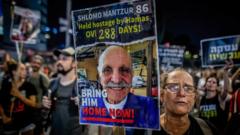In a recent hostage exchange related to the ongoing ceasefire, Hamas has handed over the bodies of four Israeli hostages, prompting a significant release of over 600 Palestinian prisoners from Israeli custody. As DNA confirmations are awaited, both sides grapple with heightened emotional and political ramifications of the recent events.
Ceasefire Exchange Concludes: Four Israeli Bodies Returned Amid Ongoing Tensions

Ceasefire Exchange Concludes: Four Israeli Bodies Returned Amid Ongoing Tensions
Hamas transfers remains of four Israeli hostages to Israel, triggering significant prisoner releases, while negotiations for future exchanges remain uncertain.
Hamas has delivered what it claims are the remains of four Israeli hostages to Israel as part of a broader prisoner exchange that has led to the release of over 600 Palestinians, including many from Gaza and the West Bank. The bodies, which are yet to be confirmed via DNA testing, belong to Shlomo Mansour, 86, Ohad Yahalomi, 50, Tsachi Idan, 50, and Itzik Elgarat, 69. These individuals were abducted during the violent outbreak of hostilities that commenced on October 7, 2023.
On Thursday, as part of the ceasefire agreement set to expire on Saturday, Israel began its own wave of releases, returning numerous Palestinian prisoners to jubilant crowds who greeted them in their hometowns. The four Israeli bodies were transferred discreetly, adhering to Israel’s requests for non-public handovers, especially after a controversial misidentification incident last week that saw the body of a Palestinian woman mistakenly returned instead of Israeli Shiri Bibas.
Reports have surfaced indicating that the DNA tests on the bodies are currently being processed at a forensics lab in Tel Aviv, following initial examinations near the border. Previous exchanges have been marred by accusations from Israel regarding the treatment of hostages by Hamas during handovers. A Hamas official indicated that this latest exchange would proceed without public visibility to prevent any delays from the Israeli side.
The returning Palestinian prisoners, which include over 400 from Gaza, were seen being welcomed back in various locations, with images showing large crowds celebrating the release. In contrast, the Israeli military has reported that the four deceased hostages were presumed to have been killed during the initial assaults when they were abducted.
The release comes at a critical juncture in the negotiations surrounding the ongoing ceasefire. While the first phase is concluding, uncertainty looms over whether an extension will be negotiated or if talks for the next phase—which may involve the release of more hostages—will commence.
Additionally, a somber atmosphere pervaded Israel as the funerals of three hostages killed in captivity took place, bringing further attention to the painful reality of the ongoing conflict that has resulted in hundreds of deaths and the hostage crisis.
The exchange marks a pivotal moment in the tumultuous relations between Israel and Hamas, as the international community remains watchful of further developments in the ceasefire and potential negotiations.



















